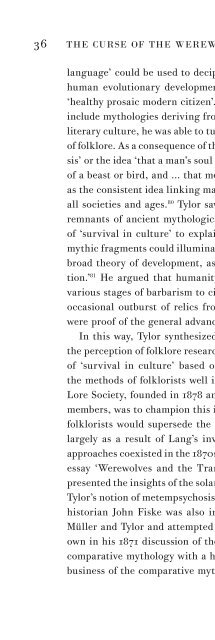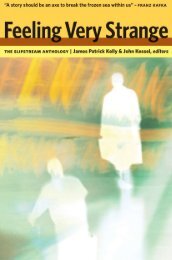The Curse of the Wer.. - Site de Thomas - Free
The Curse of the Wer.. - Site de Thomas - Free
The Curse of the Wer.. - Site de Thomas - Free
Create successful ePaper yourself
Turn your PDF publications into a flip-book with our unique Google optimized e-Paper software.
36 THE CURSE OF THE WEREWOLF<br />
language’ could be used to <strong>de</strong>cipher ‘primitive’ cultures and explain<br />
human evolutionary <strong>de</strong>velopment from <strong>the</strong> ‘savage’ through to <strong>the</strong><br />
‘healthy prosaic mo<strong>de</strong>rn citizen’. 79 By extending Müller’s approach to<br />
inclu<strong>de</strong> mythologies <strong>de</strong>riving from societies that had not <strong>de</strong>veloped a<br />
literary culture, he was able to turn his attention to <strong>the</strong> oral traditions<br />
<strong>of</strong> folklore. As a consequence <strong>of</strong> this focus, he i<strong>de</strong>ntified ‘metempsychosis’<br />
or <strong>the</strong> i<strong>de</strong>a ‘that a man’s soul may go out <strong>of</strong> his body and enter that<br />
<strong>of</strong> a beast or bird, and … that men may be transformed into animals’<br />
as <strong>the</strong> consistent i<strong>de</strong>a linking manifestations <strong>of</strong> <strong>the</strong> werewolf belief in<br />
all societies and ages. 80 Tylor saw such folk legends as <strong>the</strong> surviving<br />
remnants <strong>of</strong> ancient mythological systems, and utilized <strong>the</strong> concept<br />
<strong>of</strong> ‘survival in culture’ to explain <strong>the</strong>ir importance. <strong>The</strong> survival <strong>of</strong><br />
mythic fragments could illuminate aspects <strong>of</strong> history and ‘confirm <strong>the</strong><br />
broad <strong>the</strong>ory <strong>of</strong> <strong>de</strong>velopment, as opposed to <strong>the</strong> <strong>the</strong>ory <strong>of</strong> <strong>de</strong>generation.’<br />
81 He argued that humanity had long been advancing through<br />
various stages <strong>of</strong> barbarism to civilization, and that <strong>the</strong> survival and<br />
occasional outburst <strong>of</strong> relics from <strong>the</strong>se past stages <strong>of</strong> <strong>de</strong>velopment<br />
were pro<strong>of</strong> <strong>of</strong> <strong>the</strong> general advancement <strong>of</strong> humankind.<br />
In this way, Tylor syn<strong>the</strong>sized <strong>the</strong> folklorists’ work and fur<strong>the</strong>red<br />
<strong>the</strong> perception <strong>of</strong> folklore research as an empirical science. His notion<br />
<strong>of</strong> ‘survival in culture’ based on evolutionary <strong>the</strong>ory was to shape<br />
<strong>the</strong> methods <strong>of</strong> folklorists well into <strong>the</strong> twentieth century; <strong>the</strong> Folk-<br />
Lore Society, foun<strong>de</strong>d in 1878 and including Andrew Lang among its<br />
members, was to champion this i<strong>de</strong>a. Eventually, <strong>the</strong> anthropological<br />
folklorists would superse<strong>de</strong> <strong>the</strong> school <strong>of</strong> comparative mythologists,<br />
largely as a result <strong>of</strong> Lang’s invectives against Müller, but <strong>the</strong> two<br />
approaches coexisted in <strong>the</strong> 1870s, as evi<strong>de</strong>nced by Charles Hardwick’s<br />
essay ‘<strong>Wer</strong>ewolves and <strong>the</strong> Transmigration <strong>of</strong> Souls’ (1872), which<br />
presented <strong>the</strong> insights <strong>of</strong> <strong>the</strong> solar and celestial mythologists alongsi<strong>de</strong><br />
Tylor’s notion <strong>of</strong> metempsychosis. 82 <strong>The</strong> nineteenth-century American<br />
historian John Fiske was also influenced by <strong>the</strong> approaches <strong>of</strong> both<br />
Müller and Tylor and attempted to syn<strong>the</strong>sise <strong>the</strong>ir insights with his<br />
own in his 1871 discussion <strong>of</strong> <strong>the</strong> werewolf. Fiske sought to combine<br />
comparative mythology with a historical approach, stating, ‘It is <strong>the</strong><br />
business <strong>of</strong> <strong>the</strong> comparative mythologist to trace <strong>the</strong> pedigree <strong>of</strong> <strong>the</strong>





